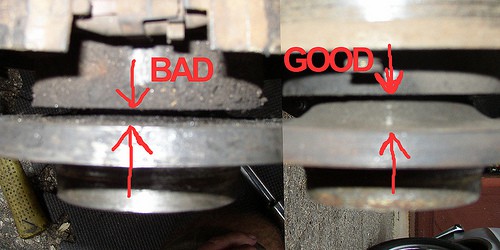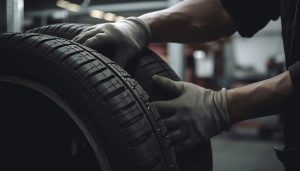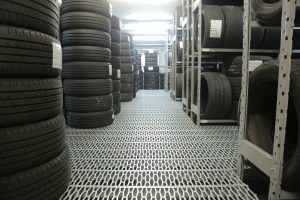Car brakes work similar to bicycle brakes, where friction is applied from the brake pads to the bicycle tire’s rim or discs for a disc brake system. Over time, as you would expect the friction will generate some measure of wear and tear and even Different driving styles, traffic and road conditions also affect how a car is driven making it almost impossible to use mileage as an indicator when brakes need to be replaced. So how does one know when it is time to replace your brake pads, brake disc or both? Here are 4 things you can do to determine your next brake change.
#1 The touch and see inspection
Most car wheels now are designed in such a way where the disc brakes are visible and even physically accessible. Make sure you do not perform this inspection right after using the car as the brake discs or rotors are still hot. Reach in with your hand and run your finger from the inside the disc all the way outside to the edge. When brakes are applied, the brake pads will apply pressure to the inside of the brake disc. So as the brake disc wears out, you will notice a rim that is formed on the outside edge of the rotor. The more pronounced it is or the more it juts out, the more wear has occurred. This inspection is not always possible as some car wheels have smaller gaps and some cars use drum brakes so no wear is visible.

#2 High Pitch Squealing Sound
Brake pad manufacturers build-in a wear indicator made of metal, called squealers as part of the brake pads. As the brake pads wear over time, the metal in the brake pads will eventually make direct contact with the disc and create a high pitch sound. This may be inaudible to some and especially in heavy traffic and ambient noise. So you can always test this in a secluded and quiet road that is free of traffic with your windows down. Keep a keen ear for that high pitch sound. If you hear it, then it is time to get them replaced. There is an exception to this for small compact cars as more metal is used in the brake pads and on the first few stops. Metal rubbing against metal = metallic scratchy sound. But if the sound is persistent even after a long time then it is time for a change. “A high-pitched squeal often happens on smaller cars and is heard in the first few stops when brakes are cold and damp.” ~ Howstuffworks.com

Brake pad manufacturers build-in a wear indicator made of metal, called squealers as part of the brake pads. As the brake pads wear over time, the metal in the brake pads will eventually make direct contact with the disc and create a high pitch sound. This may be inaudible to some and especially in heavy traffic and ambient noise. So you can always test this in a secluded and quiet road that is free of traffic with your windows down. Keep a keen ear for that high pitch sound. If you hear it, then it is time to get them replaced. There is an exception to this for small compact cars as more metal is used in the brake pads and on the first few stops. Metal rubbing against metal = metallic scratchy sound. But if the sound is persistent even after a long time then it is time for a change. “A high-pitched squeal often happens on smaller cars and is heard in the first few stops when brakes are cold and damp.” ~ Howstuffworks.com
#3 Brake Dust Accumulation
Another obvious sign that your brakes need changing is the accumulation of excessive brake dust on your wheel. When the brake dust oxidizes and rusts your regular silver wheel will start looking brown to a dark brown colour.
#4 Vibration when braking
If you experience vibration or pulsing when braking it is a sign that the brake disc is warped orthe brake pads are worn. In either case bring your vehicle in for inspection as your brake effectiveness has been compromised. When in doubt, always bring your car in for professional inspection. Brake failure is not something you want to gamble with and can be fatal if they fail.
While you are at this, do also read about how to check your brake fluid levels.
Photo Credit:
http://procarmechanics.com/differences-between-drum-brakes-and-disc-brakes/ discvsdrumbrake.jpg
http://forums.bimmerforums.com/forum




